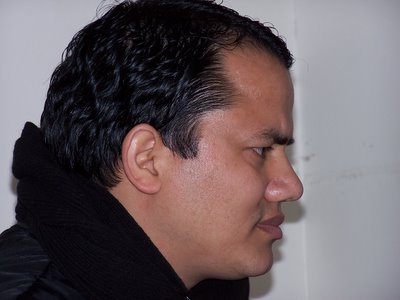
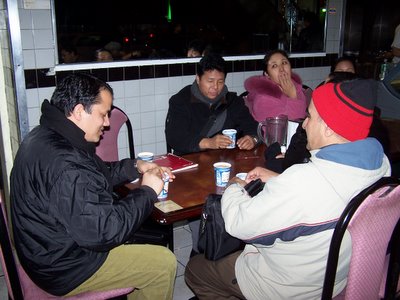
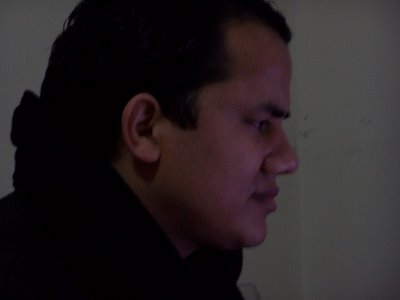
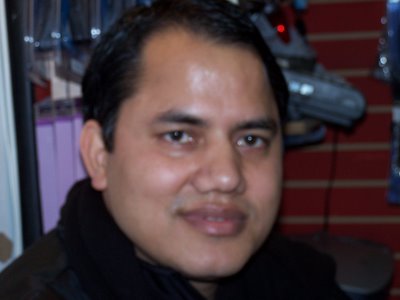
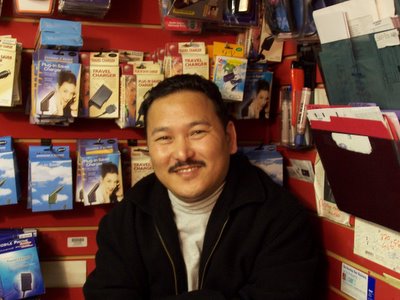
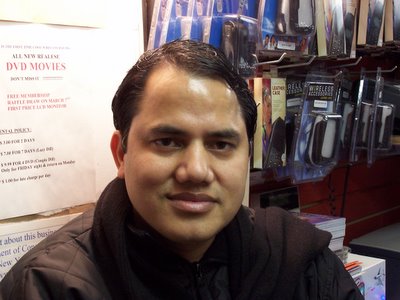
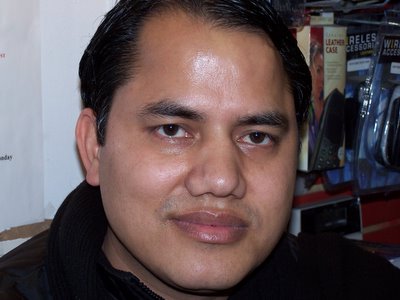
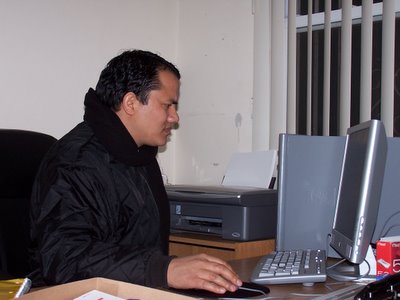
Anand Bist is among the most active Nepalis in the US in the democracy movement. I have met him many times since I have been in New York City. And we stay in regular touch, over the phone and over email. I was talking to him last night, in anticipation of the symposium on Saturday, and he told me a few stories about him that really got my attention. So I told him I wanted to talk to him in person so I could write a profile on him at my blog. He has Mondays and Tuesdays off. After I got his email saying he was available today, I called him and we arranged to meet in Jackson Heights. I drove there. I barely skipped the evening rush hour traffic. Parking before 7 PM is one hour at a time, so I had to keep coming back to pop in more quarters into the meter. I did that thrice.
We met first at Subhash Lama's wireless phone shop in the basement of the Eagle movie theater. Lama is president of the Tamang Society. Then we walked over to the office of Nepal Khabar, the new Nepali weekly in town. There we met up with Bishwa Shah. The office is over the Yak restaurant. The owner of the restaurant also dropped by. He was to fly off to Nepal in a day or two. So Anand handed him the letter that he had composed to send to Girija Koirala.
Now there are two Nepali language papers out of New York City, Nepali Aawaz and Nepal Khabar. I met up with Kashish Shrestha, the editor of the Aawaz, Sunday evening. Our talk was mostly political.
There are two new papers also out of DC. Aawaz seems to have opened up the floodgates.
Then we moved on to the Kabab place. There we met up with Banshalal Tamang of Sindhupalchok and also a new arrival from Gorakha, a Nepali Congress veteran who was two years junior to Baburam Bhattarai at high school.
It has been quite an evening. Anand also has put me in touch with some people in Ridgewood, people like Madan Gyawali. Looks like a lot of Nepalis live there. It is Ridgewood, Elmhurst, and Jackson Heights.
Anand Bist is a doer, a go-getter. He comes across as impatient, he talks fast. Sometimes he can sound incoherent. It is because he has a lot on his mind, a lot of phone calls to make, a lot of people to meet, a lot to do, and all on top of a full time job. He is a young man in a hurry. He is effective, and has little time for those who will talk endlessly and not do much. This guy is a democrat.
Anand is from Doti. He was born in 1972. He grew up in Dhangadhi. He did his 10 plus two in Dehradoon. During the 1990 movement, he was active in Delhi, which is a little while from Dehradoon, "like DC is from New York City." Two years later he attended the national conference of the Nepal Students Union in Butwal. He was one of the two representatives of the organization from India. He was also active with the NSU at Shankardev Campus in Kathmandu.
He came to the US in 1998 to New York City. Upto 2002 he was active with the various Nepali social organizations. He has consistently helped the new Nepali arrivals with job and apartment searches, with I-20 issues and things like that, as many as he can.
All that changed in 2002 after the parliament got dissolved. His social engagement did not decrease, but his focus became much more political.
"I collected 350 signatures over two weeks to denounce the dissolution of the parliament, the dismissal of Deuba." That hit the headlines with Kantipur. He was decisive when the Congress and the UML were still unsure as to which way to go. Many in those parties were actually happy Deuba was out.
Up to that point, he was one person, there was no organization. He registered the Nepal Democratic Youth Council on December 7, 2002 with the State Department. By now the Council has 25 chapters in the US and nine in other countries. The Council has helped organize six rallies so far, four in DC and two in front of the UN. The Council has lobbied Senators and Congressmen. The next big push is for February 18, we are trying to get Girija Koirala to come here, he said. That is the traditional Democracy Day in Nepal.
The Council provides a platform for the visiting Nepali dignitaries, politicians, artists, human rights activists, and journalists. "Girija Koirala and Sher Bahadur Deuba are the only prominent leaders we have not hosted yet," he says. "We have hosted Madhav Nepal."
His group also helps Nepalis who win DV lotteries but do not have any contacts in the US.
Nepal maganize in Kathmandu once profiled him in a major way. Based on that he gets emails from Nepal from people requesting his help.
At the 2005 ANA Convention in Dallas, he had a minor spat with the Nepali ambassador to the US, Kedar Bhakta Shrestha. The ambassador basically told him he should go back to Nepal if he wants to do politics. Bist told him to mind his own business. The spat hit the headlines in Nepal. "It was front page news in Kantipur."
He gets threatening emails from Nepal. "How long will you stay in the US? When you come back to Nepal, we will take care of you." He has filed a complaint with the FBI with help from Sadai, the prominent Nepali lawyer. That protects him from any threats he might receive from anyone in the US. But threats from Nepal stay on like background radiation.
I asked if any one from his family has been harassed in Nepal. He said no.
The Council has organized 25-30 programs so far.
He would like to take some credit for the idea of organizing gherao programs at Nepali embassies. It was first done in the US. Then it has been copied in Australia, UK, Hong Kong, Belgium.
At this point Subhash Lama interjected that there are a lot of Maoist sympathizer Nepalis in Belgium.
"I am watching the seven parties. Soon it might be time to go for the final, decisive push," Anand said.
The Council does a lot of letter writing. It has also received a lot of letters, from lawmakers and major bodies like the European Commission. He faxed those letters to the Nepali media.
"Except for a handful of Nepalis who benefit from the palace directly, all else are for democracy," he says about the Nepalis in the US. But not all are out in the open because they fear the king might harass their families back home.
He says the Council will also work for Nepali unity. "There are people from many ethnic backgrounds, but all are Nepali."
The Council coordinates with the Alliance for Democracy and Human Rights in Nepal, another major local Nepali organization, but these groups have people who hold leadership positions in both. After democracy arrives, the Council will stay on as a watchdog organization to help democracy grow in the country, Anand says.
Anand claims the 12 point agreement between the Maoists and the seven parties has been a major milestone. That has made it possible for the people to come out into the streets in large numbers. The fear has gone.
We had a minor disagreement. I said it was Deuba not the king who dissolved the parliament in 2002. The king dismissed Deuba six months later, and then invited the formation of an all party government. Up to that point, the king had not done anything wrong. The parties should have taken that offer and then gone for unconditional peace talks with the Maoists to lead to constituent assembly elections, but then at that point in time neither the Congress nor the UML were for a constituent assembly yet. Then I lose him, and after the 2/1 coup, the king has basically become a Third World Dictator.
Anand blames the king for the parliament dissolution.
I asked Anand what could the diaspora do to jack up the movement. He talked in terms of more protest rallies, more events like talk programs, more letter writing, more lobbying of the lawmakers.
But I think all that still falls in the moral support category. More of the same will not be enough. We need to steer the diaspora to provide active logistical support to the movement in Nepal. We need people to donate anywhere between $10 and $1000 to the five projects. And we need people to pose for group photographs to be uploaded at Flickr so as to show thousands of Nepali faces that support the cause of democracy. The diaspora movement needs to go mass based.
Lobbying lawmakers and foreign powers also will only go so far. The king received a personal letter from the most powerful human being on earth itself, President Bush. But he did not budge. A mass movement is the only option.
But all that we get to discuss on Saturday with a larger group of Nepali leaders from all across the country. The five families will be there.
Also this blog is political work, this is not journalism.
And this thing that we are doing on Saturday, why can't we do it online every day, 24/7? There would be no barrier to entry. People would have the option for text, audio (Audioblogger, Blastpodcast) and video (YouTube). That way we can involve 5,000 or more as opposed to 50 people. The movement for democracy has to be mass based. Or perhaps we can do both. Both face time and screen time.
Also, the regime is like a log in the way. Our group dynamics model should be such that every person and organization we can get hold of, we should mak use of. We all need to work together to push the log out of the way. We should watch out for territorial behavior among us. The cause of democracy is bigger than any of us. We all have to work in sync.
Advisors, Doers, Donors, Supporters, Cheerleaders, Spectators, Whiners
Diaspora Dynamics
The Cloud Model, Not The Pyramid Model
Visitors
| 05:11 | Deutsche Telekom AG, Germany |
| 10:27 | Universität Bonn, Bonn, Germany |
| 10:28 | Electric Lightwave Inc., United States |
| 10:49 | Smart Telecom Holdings, Ireland |
| 15:17 | KORNET, Korea |
| 16:33 | Barak, Israel |
| 16:46 | Brasil Telecom, Brazil |
| 17:29 | University of Wisconsin, Madison, United States |
| 18:34 | Wanadoo France, Rennes, France |
| 19:14 | Mariner Systems, Inc., Canada |
In The News
RPP undergoes vertical split, dissident faction elects Home Minister Thapa as its new leader NepalNews
NC (D) general convention elects CWC members Uma Adhikari and Dina Upadhyay who contested for the two reserved seats for women also made it to the CWC while Indra Bahadur Gurung and Bhisma Raj Aangdungbe secured the CWC seats allotted for indigenous nationalities and Dal Singh Kami and Umakant Chaudhary and Khimkanta Jha were elected for reserved seats for Dalits and the Terai community respectively. Jeevan Bahadur Shahi was nominated unopposed for the CWC membership from one seat reserved for Karnali region.
Thousands march from Bhaktapur to Kathmandu calling for democracy
Harassment of journos continues in Nepal: RSF
Suspected Maoists bomb Kanchanpur DDC office
Palace Driving Wedge into Political Parties: Nepal NewsLine Nepal, Nepal
Watchdog condemns Nepal’s media harassment Daily Times, Pakistan
Nepali American Public Affairs Council (NAPAC) & America Nepal Friendship Society (ANFS) Present A non-partisan public affairs forum on: (a brainstorming session) Peace and Democracy in Nepal